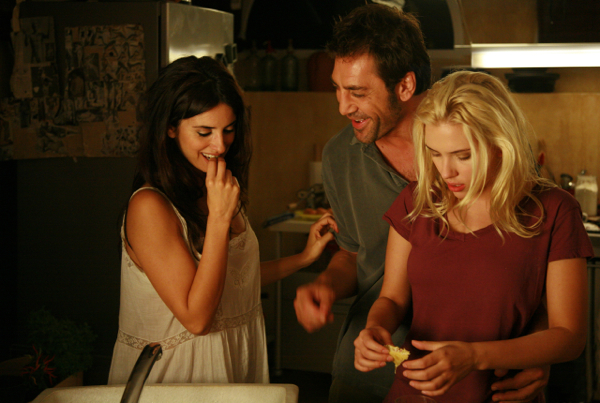Movie review by Greg Carlson
A tasty dessert prepared with just the right combination of sweet and tart, Woody Allen’s “Vicky Cristina Barcelona” is one of the year’s most enjoyable movie experiences. Buoyed by delightful performances from an ensemble of gorgeous creatures made all the more beautiful by the alluring Spanish surroundings, “Vicky Cristina Barcelona,” like Allen’s finest films, considers romantic love from a multitude of angles. Funny, charming, and clever, the movie reinforces the director’s longstanding worldview: Allen privileges the epicure’s delight, even though he knows most of us will err on the side of convention and caution.
Seasoned enough to pull off the inclusion of voiceover narration in which the audience is introduced to two young American women spending the summer in Barcelona, Allen sets up his title characters as diametric opposites in temperament and taste, despite their enduring friendship. Vicky (Rebecca Hall), whose sharp dialogue will remind Allen aficionados of the director’s own enduring comic voice, is a skeptic who depends on the comforts of predictability and routine. Cristina (Scarlett Johansson) is impetuous, restless, and slightly reckless when it comes to relationships. As the movie explains more than once, Cristina is not sure exactly what she wants, but she knows what she doesn’t want.
Shortly after arriving in Spain, the friends make the acquaintance of Javier Bardem’s sensual artist Juan Antonio, who introduces himself by suggesting the three of them share a weekend of sex together. The women, like the viewers, are initially shocked, and press for some clarification. In one of the best lines in the film, Juan Antonio defends his bold proposition by explaining that “Life is short, dull, and full of pain.” While this particular sentiment might not be enough to placate hardened cynics, Allen presents it with such straightforward simplicity that many audience members burst out laughing at the blunt, unfiltered audacity of the idea. Juan Antonio, a hedonistic painter who initially seems like nothing more than a macho, Latin lothario stereotype, turns out to be much more complex than meets the eye, and Bardem is perfect in the role.
What follows includes a series of turnabouts, reversals, and surprises, and “Vicky Cristina Barcelona” would have been a good movie merely to follow the couplings to their conclusions. Allen has more ambitious things in mind, however, and lights a fuse with the introduction of Juan Antonio’s ex-wife Maria Elena (Penelope Cruz). Cruz’s sudden appearance changes the entire dynamic of the movie’s relationships, and the performer demonstrates tremendous flair, delivering her lines in a rapid-fire blend of Spanish and English that leaves all interlocutors begging for mercy.
For decades, Allen has dissected affairs of the heart with deft comic timing and no small amount of heartache and longing for an ideal that doesn’t exist outside of our own fantasies. “Vicky Cristina Barcelona” proves a nice addition to that tradition, and might just inspire some moviegoers to rent some of Allen’s classic work to see what the fuss was about thirty plus years ago, when the filmmaker was the toast of both cineastes and a public out for a good time at the movies.
